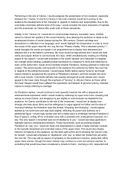Performing in the role of Clarice, I would juxtapose the presentation of her character, especially
between Act 1 Scene 12 and Act 2 Scene 4. My main intention would be to portray to the
audience the development of her character in regards to maturity and responsibility. Due to the
commedia commedia dell'arte style of the play, I would consider the stock characters of Isabella
and the innamorati, as Clarice falls under both of these caricatures.
Initially, in Act 1 Scene 12, I would aim to communicate Clarice's conceited, naive, childish
nature to ridicule her position in the social hierarchy, thus allowing the audience to relate to the
emphasized division of social classes during the 18th century. Clarice's privilege and
dramaticism is reflected in her language, and I would highlight her desperation in order to mock
the issues of the upper class life. As I say the line, "Please, Daddy. This is absolute tyranny," I
would elongate the words and speak in an anguished tone to display how distressed and
helpless she is to her father's command. My voice would be high pitched and I would use both
clarity and proper diction to communicate her class, whilst simultaneously creating an irritating
aspect to her speech. I would add emphasis to the words "please" and "absolute" to heighten
her outrage whilst creating a pleading facial expression by creasing my brow and widening my
eyes; at the same time I would move hurriedly towards Pantaloon, looking upwards to make eye
contact. This would visually communicate to the audience the authority her father has over her,
in regards to the patriarchal society. I would pause briefly before saying "tyranny" as though
Clarice herself is questioning the severity of Pantaloon's demand, and then exclaim the word
with a loud volume. Commedia dell'arte was popular amongst all social classes and I would
appeal to the lower class through the emphasis of "tyranny" to ridicule Clarice as those within
the lower classes would have suffered the oppression and despair of genuine tyranny, whereas
Clarice is simply referring to marriage.
As Pantaloon replies, I would continue to look upwards towards him with a desperate and
sickened facial expression which I would create by widening my eyes once more, creasing and
raising my brows further, and dropping my jaw slightly to communicate my disbelief to the
audience. As Clarice contributes to the role of the innamorati, I would aim to display how
strongly she feels about Silvio and her willingness to argue against her father and the idea of
marrying Federigo. As Pantaloon says the phrase “chopping and changing,” I would appear
startled by his harsh tone and step back slightly, reflecting his power and authority as a
patriarchal figure. I would reply quickly and with a faster pace to irritatingly interrupt Pantaloon’s
flow of speech, cutting off his controlled voice with a panicked and undisciplined response. As I
say, “the only reason I consented was out of obedience to you,” I would use large gestures to
highlight Clarice’s unrestrained emotions. These movements, such as pointing towards
Pantaloon as I say “you,” would be harsh and emphasised to create a highly dramatic contrast
to the typically disciplined and controlled nature of the upper-class. This would also display
Clarice’s immaturity to the audience, as she lacks self-control and is showing her concern only
for herself. I would add emphasis to “obedience” and “you” to reflect her limited free will within
her own life. This may add an aspect of sympathy to the audience’s reaction, particularly within
upper-class women, though the lower classes may continue to mock her extreme reaction to
something that would have been considered a miracle to them - marrying a rich, respected and




